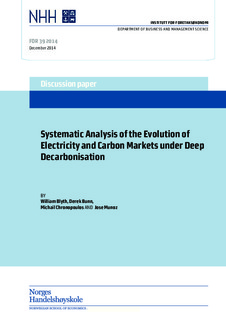Systematic Analysis of the Evolution of Electricity and Carbon Markets under Deep Decarbonisation
Working paper

Åpne
Permanent lenke
http://hdl.handle.net/11250/227052Utgivelsesdato
2014-12Metadata
Vis full innførselSamlinger
- Discussion papers (FOR) [566]
Sammendrag
The decarbonisation of electricity generation presents policy-makers in many countries with the delicate task of balancing initiatives for technological change whilst maintaining a commitment to market liberalisation. Despite the theoretical attractions, it has become debatable whether carbon markets by themselves can offer a complete solution. We address this through a modelling framework, stylised for the GB power market within the EU ETS, which includes three distinct components: (a) a long-term least-cost capacity planning model, similar in functionality to many used in policy analysis, but innovative in providing the endogenous calculation of carbon prices; (b) a short-term price risk model producing hourly dispatch and pricing outputs, which are used to test the annual financial performance risks implied by the longer-term investments; (c) an agent-based model which uses a computational learning algorithm to derive pricing behaviour in imperfect markets. The results indicate that the risk/return profile of electricity markets deteriorates substantially as a result of decarbonisation, reducing the propensity of companies to invest in the absence of increased government support. Markets may adjust, if allowed, by deferring investment until conditions improve, or by consolidating to increase market power, or by operating in a tighter market with reduced spare capacity. To the extent that each of these ‘market-led’ solutions may be politically unpalatable, policy design will need to sustain a delicate regulatory regime, moderating the increasing market power of companies whilst maintaining low-carbon subsidies for longer than expected.